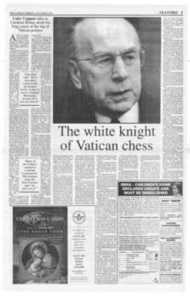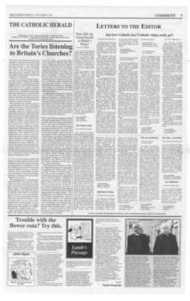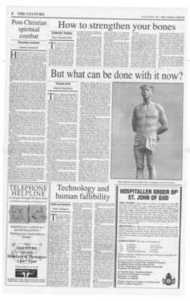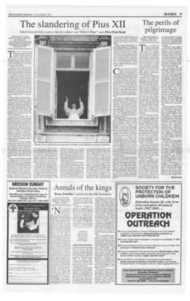Page 9, 8th October 1999
Page 9
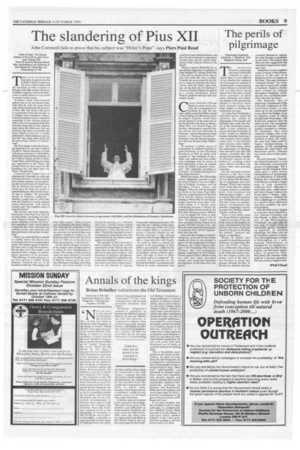
Report an error
Noticed an error on this page?If you've noticed an error in this article please click here to report it.
Tags
Share
Related articles
Vatican Dismisses Writer's Attack On Pope Pius Xii
Benedict Xvi Speaks Up For His Maligned Predecessor
Vatican Congregation Sets Wartime Pope On The Road To...
The Lessons Of The Cornwell Affair
The Sheer Wickedness Of Myths About 'nazi' Popes
The slandering of Pius XII
John Cornwell fails to prove that his subject was "Hitler's Pope", says Piers Paul Read
Hitler's Pope: The Secret History of Pius XII by John Cornwell, Viking. £20 Pius XII and the Second World War, according to the Archives of the Vatican by Pierre Blet, SJ, Gracewing £17.99
THERE CAN BE NO DOUBT that humanity in general and the Catholic Church in particular has yet to come to terms with the enormity of what occurred in Europe in the 20th century. However, it belittles tragedies such as the Holocaust to exploit them to score points in current controversies.
In Hitler's Pope John Cornwell openly tries to tar our present pope, John Paul II, with the same brush with which he blackens the memory of Pius XII. The book's title gives us a good idea of the spin he puts on a complex and contentious subject. Cornwell purports to have started his researches in the Vatican archives with a view to exonerating Pope Pius from the charge that he was culpably silent about the Holocaust, but was forced by the facts to conclude that there should in fact be "a wider indictment" which embraces not just Pius but "the papal office itself and the prevailing culture of Catholicism".
His first charge is that the Concordat negotiated by the then Cardinal PaceIli as Vatican Secretary of State with the government of Adolf Hitler effectively destroyed the possibility of the Catholic bishops and the Catholic Centre Party under Bruning mounting any opposition to the Nazis: the Centre Party in fact voted for the Enabling Act, the legal basis for Hitler's dictatorship.
Cornwell also claims that, in imposing the Concordat on a reluctant German hierarchy, Cardinal Pacelli had a hidden agenda: by incorporating the revised Code of Canon Law that he himself had drawn up, it would give the Pope the power to appoint bishops to the German dioce ses and so confirm "the pyramidal model of Catholic authority – whereby a single man in a white robe rules the Church in a vastly unequal power relationship" with church councils and "the countless webs of local discretion".
The second, and more damning, indictment is that Pope Pius XII was an anti-semite. According to Corn well, Eugenio Pacelli "displayed a secret antipathy towards the Jews" that contradicts "later claims that he respected the Jews and that his wartime actions and omissions had been performed with the best of intentions".
There is no doubt but that Cornwell is a skilful writer who knows how to dramatise the most commonplace events. His charges against Pope Pius XII were sure to catch the headlines. But are they true? The reader is not reassured with a display of extraordinary ignorance in his prologue. "The ideology of papal primacy, as we have known it within living memory," Cornwell tells us, "is an invention of the late 19th century and early 20th century". What of popes such as Gregory the Great, Gregory VII, Innocent ifi or Boniface VIII. who wrote in Unam Sanctam that it was necessary for salvation that every creature should be subject to the Roman pontiff; and in the first Holy Year of 1300 sat on his throne in Rome proclaiming, "I am Caesar"?
On the specific charges, Comwell's book contains quite enough evidence to refute his own interpretation of events. The charge of anti-semitism cannot be taken seriously: it is based on a letter written by Pacelli as nuncio in Munich, drawn up by his assistant, Monsignor Schioppa, describing Lieven, one of the leaders of the Bolshevik uprising. as a "Russian and a Jew", and the women milling around his headquarters of dubious appearance, "Jews like the rest of them". Pacelli also describes Lieven's bodyguard as a hunchback: does this mean that Pacelli also had an animus against the disabled?
The question of the Concordat is more complex. Given the terrible persecution of the Church that had taken place in Mexico and Russia, and was to take place in Spain, with thousands of religious slaughtered, it was reasonable for Cardinal Pacelli, as Secretary of State to Pius XI, to try and secure some kind of legal protection for the Church by signing Concordats with fascist dictators. The idea that the Catholic Centre party with 13.9 per cent of the vote could have stopped Hitler's accession to power is patently absurd. As the British minister to the Vatican reported to the Foreign Office in1933 after a long interview with Pacelli, "he made no effort to conceal his disgust at the proceedings of Herr Hitler's government", deplored the Nazi "persecution of the Jews, their proceedings against political opponents, the reign of terror to which the whole nation was subjected". He justified the Concordat on the grounds that Hitler's government had offered far wider concessions that could have been obtained before, and that "he chose between an agreement on their lines and the virtual elimination of the Catholic Church in the Reich".
When it comes to World War II, we can perhaps regret that, in imitation of Pope Benedict XV during World War I, Pius felt he should not be seen to side with either the Axis or Allies. Probably the most pained by his failure to explicitly denounce the Nazis' actions were the Poles: their bishops, among them the Archbishop of Cracow, Cardinal Saphia, the patron of a young seminarian, Karol Wojtyla, pleaded with him with only meagre results.
CLEARLY, POPE PIUS XII had always to assess most carefully the consequences of anything he said. He was quite rightly aware that Hitler nursed a deep loathing of Catholicism and if he judged it politic would have moved against it in the same way as the Bolsheviks had done in Russia. When Pius was elected Pope, the Berliner Morgenpost reported that the choice was not welcome in Germany "since he had always been hostile to National Socialism". Certainly, from the German perspective, Pius was far from being "Hitler's Pope".
To maintain a public stance of impartiality he restricted himself to generalisations: in his Christmas broadcast of 1942 he spoke with anguish of "the hundreds of thousands, who without any fault of their own, sometimes only by reason of their nationality or race, are marked down for death or gradual extinction". This statement, according to Cornwell, "trivialised and denied the Nazi Final Solution".
Behind the scenes, Pius XII exerted intense diplomatic pressure to save the lives of Jews; it was most effective in Catholic countries such as Slovakia, Croatia, France and Hungary. These are well documented in a book by the Jesuit, Pierre Blet, who was commissioned by Pope Paul VI to edit the Vatican documents relating to World War II; and though it has a narrower focus than Cornwell's book, it is finally more convincing because it details the numerous interventions made by the Holy See, showing just how difficult it was to impede the Nazis in their diabolical determination to kill all Jews. Nevertheless, Jewish sources have calculated that the Church saved around 850,000 Jewish lives, and Pius received numerous expressions of gratitude from Jewish organisations after the war.
And even after reading Comwell's intriguing, provocative but finally slanderous book we are inclined to agree with the judgement of Robert Kempner, the United Nations delegate to the Nuremberg War Crimes Tribunal, that "any propaganda attempt undertaken by the Catholic Church against Hitler's Reich would not only have been provoked suicide...but would have hastened the execution of still more Jews and priests".
blog comments powered by Disqus







